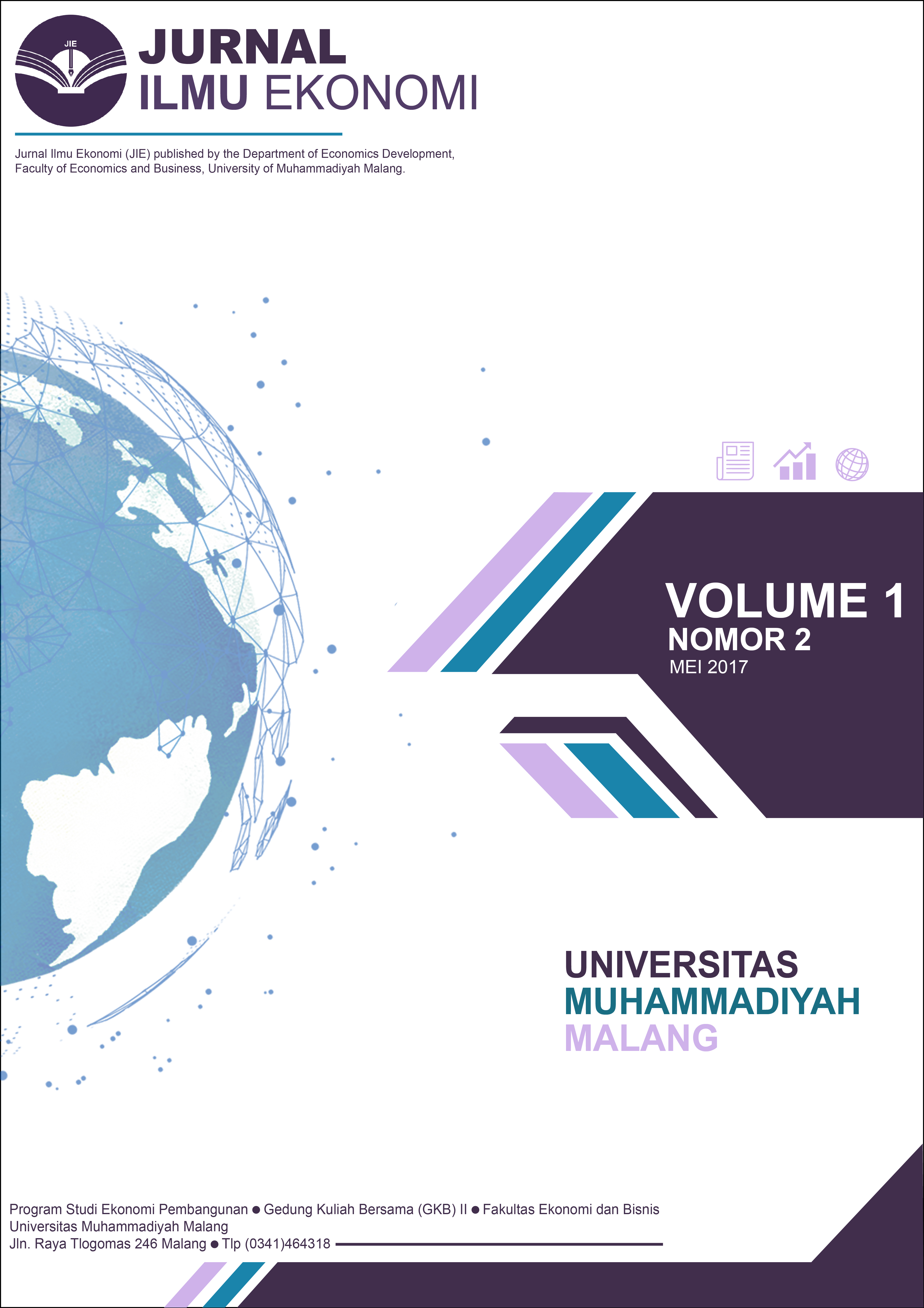PENGARUH PENDAPATAN ASLI DAERAH, INDEKS PEMBANGUNAN MANUSIA DAN TENAGA KERJA TERHADAP PRODUK DOMESTIK REGIONAL BRUTO (38 Kabupaten/Kota di Provinsi Jawa Timur Tahun 2011-2016)
DOI:
https://doi.org/10.22219/jie.v1i2.6143Abstract
This research is aimed at finding the increase of authentic-local income, human development index, and labors in some cities/regencies in East Java. Further, this research is aimed at find out the influence of authentic-local income, human development index, and labors on the gross regional domestic product in some cities/regencies in East Java. In this research, the researcher used multiple regression as the research instrument with panel data during the period 2011-2016. This research used Fixed Effect Model as the research design. Based on the result of data analysis, it showed that the variable of authentic-local income positively and significantly influenced the coefficient equal to 38.25679, human development index negativ significantly influenced the coefficient equal to -514690.0, and labors significantly influenced the coefficient equal to 26.10263. Meanwhile, the determination coefficient (R2) was 0.99 or 99%. It indicated that the potentiality of authentic-local income, human development index, and labors in determining gross regional domestic bruto was 99%. Keywords: Gross Regional Domestic Bruto, Authentic-Local Income, Human Development Index, and LaborDownloads
References
Arifin, Z. (2009). Analisis pertumbuhan ekonomi dan penyerapan tenaga kerja di provinsi jawa tengah. Arsyad. (1999). Pengantar perencanaan dan Pembangunan Ekonomi Daerah. Yogyakarta: BPFE. BPS. (2015). Jawa Timur dalam Angka. Domar & Gujarati. (2001). Mengelola data statistik secara profesional. Jakarta: PT. Alex Media Komputindo. Fair, C. and. (2006). Prinsip -prinsip ekonomi edisi ke delapan. Jakarta: Erlangga. Handaka, A. dan. (2017). Analisis Pengaruh Belanja Modal, IPM, dan Tenaga Kerja terserap terhadap Pertumbuhan Ekonomi Kabupaten/kota di Indonesia. Jurnal Akuntansi Manajerial, 52–63. Hariyadi. (2014). pengaruh PAD terhadap PDRB dan Belanja Modal Kabupaten/kota di Provinsi Bali. E-Jurnal EP Unud, 586–593. Khodabakhshi, A. (2011). Relationship between GDP and Human Development Indices in India. International Journal of Trade, Economics and Finance, 2(3), 251–253. https://doi.org/10.7763/IJTEF.2011.V2.111 Kusuma, H. K. (2017). Prosiding Tata Kelola Organisasi dan Ekonomi Pembangunan. Research Report. Muqorrobin. (2017). Pengaruh IPM terhadap Pertumbuhan ekonomi Provinsi Jawa Timur. Jurnal Pendidikan Ekonomi. Nuraini, I. (2017). KUALITAS PERTUMBUHAN EKONOMI DAERAH KABUPATEN / KOTA DI JAWA TIMUR, 79–93. Sudarti. (1998). Otonomi Daerah dan pola Hubungan Keuangan pusat-daerah. Bestari, 63– 71. Suparmoko. (2002). Keuangan dan Pembangunan Daerah. Yogyakarta: Andi. Susilowati, D., Sri, M., & Suliswanto, W. (n.d.). Manusia , Utang Luar Negeri Dan Kemiskinan ( Kajian Teoritis Di Indonesia ), 89–106. Todaro. (2011). Pembangunan ekonomi. Jakarta: Erlangga.
Downloads
Published
How to Cite
Issue
Section
License
Authors who publish with this journal agree to the following terms:
- For all articles published in the JIE (Jurnal Ilmu Ekonomi), copyright is retained by the authors. Authors give permission to the publisher to announce the work with conditions. When the manuscript is accepted for publication, the authors agree to the automatic transfer of non-exclusive publishing rights to the publisher.
- Authors retain copyright and grant the journal right of first publication with the work simultaneously licensed under a Creative Commons Attribution-NonCommercial-ShareAlike 4.0 International License that allows others to share the work with an acknowledgement of the work's authorship and initial publication in this journal.
- Authors are able to enter into separate, additional contractual arrangements for the non-exclusive distribution of the journal's published version of the work (e.g., post it to an institutional repository or publish it in a book), with an acknowledgement of its initial publication in this journal.
- Authors are permitted and encouraged to post their work online (e.g., in institutional repositories or on their website) prior to and during the submission process, as it can lead to productive exchanges, as well as earlier and greater citation of published work (See The Effect of Open Access).
This is an open access article and licensed under a Creative Commons Attribution-NonCommercial-ShareAlike 4.0 International License








